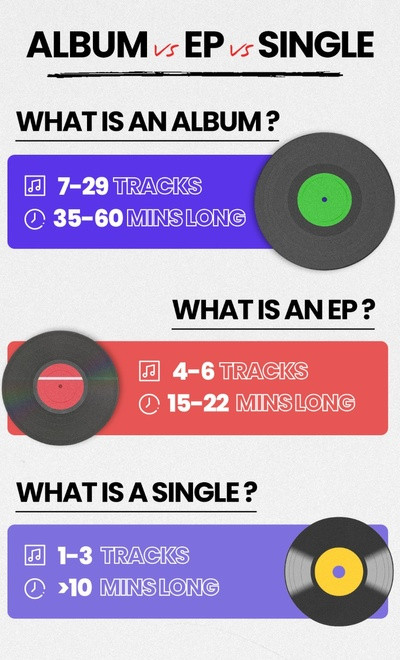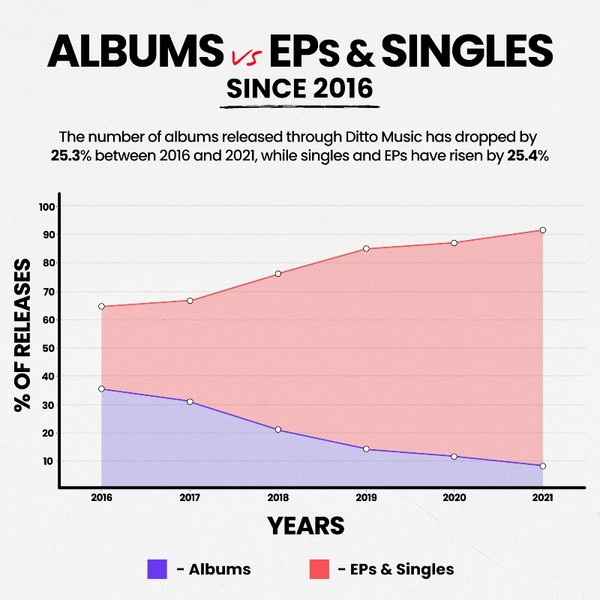How Many Songs On An Ep can make or break your music career? An EP, or extended play, is a powerful tool for musicians looking to make a splash, and at payoffsong.com, we help you navigate the nuances of music production and release. Knowing the ideal number of tracks can significantly impact your success in the music industry. Our guide provides you with the knowledge to create EPs that resonate with your audience and maximize your earnings. Master the art of EP creation and unlock new opportunities for monetization and recognition.
1. Understanding the Core Difference Between an EP and an Album
What exactly sets an EP apart from a full-fledged album? The difference lies primarily in the length and duration.
An EP (Extended Play) typically features between 4 to 6 tracks and has a running time of approximately 15 to 22 minutes, although it can sometimes extend up to 30 minutes. An album, also known as an LP (Long Play), is a more substantial body of work, generally including 7 to 29 tracks with a running time of about 35 to 60 minutes. A single, the shortest form, usually contains 1 to 3 tracks and runs for less than 10 minutes.
 Comparison of albums, EPs, and singles
Comparison of albums, EPs, and singles
2. Trends in Music Releases: The Rise of EPs
How have music release trends evolved over the years? Since 2016, there has been a noticeable shift in the music industry, with album releases declining while EPs and singles have surged in popularity.
According to data from Ditto Music, albums accounted for 35% of all releases in 2016 but dropped to just 9.7% by 2021. In contrast, singles and EPs have seen continuous growth, making up 90.3% of total releases in 2021. This trend indicates a preference for shorter formats in the current music landscape.
 Music releases trend
Music releases trend
3. Key Factors to Consider: Album or EP?
Should you release an album or an EP? The decision depends on several factors, including your budget, target audience, and musical goals.
3.1. Budget Considerations
How does your budget influence your choice between an EP and an album? EPs are generally more cost-effective to produce than albums. With fewer tracks, you’ll spend less on studio time, production, instrument rentals, and session musicians.
 Budget planning for music releases
Budget planning for music releases
3.2. Understanding Your Target Audience
How does the album format affect your audience? Your choice will directly influence how different types of fans engage with your music. EPs are great for attracting new listeners and converting them into lukewarm fans, while albums strengthen relationships with existing fans and can turn some into die-hard supporters.
3.3. Defining Your Music Goals
What do you hope to achieve with your music release? If you aim to raise your profile, experiment with your sound, or launch new merchandise or a tour, an album might be the better choice. However, if you’re focused on exploring your sound, reaching new listeners, or releasing music quickly and consistently, an EP is likely the more effective option.
 Target audience when releasing music
Target audience when releasing music
4. Why EPs Are a Strategic Choice for Emerging Artists
Why should emerging artists consider releasing an EP over an album? For new, up-and-coming artists, releasing an EP is often the preferred strategy for several compelling reasons.
4.1. Thriving in the Streaming Era
How do EPs align with the current streaming landscape? In today’s music industry, dominated by digital streaming platforms like Apple Music and Spotify, and social media platforms like TikTok and Instagram, EPs are ideally suited for release. These shorter formats allow you to showcase your strengths and brand through a curated selection of your best tracks.
4.2. Maximizing Playlist Potential
How can EPs boost your chances on playlists? Listeners are increasingly consuming music through playlists, and EPs have a higher chance of landing on popular algorithmic playlists like “Discover Weekly” and “New Music Friday.” Individual tracks from an album might get lost, but a well-crafted EP can stand out and attract new listeners. A global streaming study revealed that 54% of listeners now listen to fewer albums compared to five or ten years ago, underscoring the importance of shorter formats.
4.3. Maintaining a Consistent Release Schedule
How does an EP help maintain a regular release schedule? Releasing singles that eventually form an EP can be an excellent strategy to stay relevant and keep your fans engaged. It allows you to consistently provide new music without the extensive time and financial commitment required for a full album. This regular release schedule is crucial for growing and retaining a fanbase.
4.4. Utilizing Tracks That Don’t Fit Elsewhere
What can you do with tracks that don’t quite fit an album? An EP provides an outlet for releasing high-quality tracks that don’t align with the theme or soundscape of a larger project. As artist Tech N9ne says, never waste a song—use EPs to get every track out there.
4.5. Bridging the Gap Between Albums
How can EPs serve as a stop-gap between albums? Artists often use EPs as a precursor to a major album, introducing themes and concepts that will be explored in more depth later. An EP can serve as a way to ease your audience into a new musical direction or sound.
 Music release goals
Music release goals
5. EP Release Strategies for Success
What are the best strategies for releasing an EP? When releasing an EP, the “Waterfall Strategy” is highly effective.
Release singles consistently over time, eventually culminating in an EP. This allows you to handpick the best-performing singles for your EP, ensuring a successful release. The EP then becomes a portfolio of your highest-quality work, helping you understand what resonates with your audience and informing your future releases.
6. Album Release Strategies for Impact
How should you approach releasing an album? An album release requires a different strategy than a single or EP.
Given the months or even years of dedication required to write, record, and promote an album, it’s crucial to maintain audience engagement throughout the process. Even when working on an LP, continue releasing singles. Many established artists, like Adele with her single “Easy On Me” before her album “30,” use this approach to build anticipation and maintain momentum.
7. Making the Decision: EP Before Album?
Should you release an EP before an album? The short answer is likely yes.
Once you have released some singles and an EP or two, you’ll better understand your fans’ preferences, making the investment in an album more worthwhile. It’s important not to rush into an album release. Your first album is a significant milestone, attracting attention from fans, critics, and fellow artists. Take the time to ensure it accurately reflects your best work.
While consumption habits may favor shorter formats, people still listen to longer-form content if you capture their attention with quality and consistency.
8. Navigating the Music Landscape with Payoffsong.com
At payoffsong.com, we understand the challenges and opportunities in today’s music industry. Whether you’re deciding between an EP and an album, our resources and expertise can guide you toward success. We offer comprehensive information, helpful tips, and opportunities to connect with industry professionals, ensuring you make informed decisions and maximize your potential.
For musicians and songwriters eager to monetize their work, understanding music licensing is crucial. Payoffsong.com provides detailed information on how to license your music, protect your copyrights, and generate revenue. Whether you’re looking to license your songs for advertisements, films, or other commercial projects, we offer the resources and connections you need.
9. Understanding Music Licensing and Royalties
How can you earn money from your music? Music licensing is a key component of generating revenue from your songs. It involves granting permission for others to use your music in various contexts, such as films, TV shows, advertisements, and video games.
9.1. Types of Music Licenses
What are the different types of music licenses? There are several types of licenses that musicians and songwriters should be aware of:
- Synchronization License: Grants the right to use a song in visual media.
- Mechanical License: Grants the right to reproduce and distribute a song in audio format.
- Performance License: Grants the right to publicly perform a song.
- Master Use License: Grants the right to use a specific recording of a song.
9.2. Royalty Collection
How do you collect royalties for your music? Royalties are payments made to songwriters and publishers for the use of their music. Performance Rights Organizations (PROs) such as ASCAP, BMI, and SESAC collect performance royalties on behalf of their members. Mechanical royalties are typically collected by the Harry Fox Agency or directly from the party using the music.
9.3. Key Steps in Music Licensing
What steps should you take to license your music?
- Register Your Music: Register your songs with a PRO to ensure you receive performance royalties.
- Copyright Your Music: Protect your work by registering your copyrights with the U.S. Copyright Office.
- Network and Promote: Connect with music supervisors, advertising agencies, and film production companies to increase licensing opportunities.
10. The Role of Music in Advertising and Film
How is music used in advertising and film? Music plays a pivotal role in enhancing the emotional impact and memorability of advertisements and films. A well-chosen song can evoke specific feelings, reinforce brand identity, and connect with audiences on a deeper level.
10.1. Case Studies: Successful Music Placements
What are some examples of successful music placements?
- Apple’s iPod Commercials: Used indie and electronic tracks to create a cool, trendy image.
- Volkswagen’s “Singin’ in the Rain” Ad: Revived a classic song, connecting with multiple generations.
- Various Film Soundtracks: Films like “Guardians of the Galaxy” have boosted song popularity and sales through strategic music placements.
10.2. Trends in Commercial Music
What are the current trends in commercial music? Current trends include:
- Authenticity: Brands seek authentic, original music to resonate with consumers.
- Nostalgia: Using classic songs to evoke emotional connections and memories.
- Diversity: Featuring music from diverse artists and genres to appeal to broader audiences.
11. Legal Considerations and Copyright Protection
How can you protect your music legally? Understanding and protecting your copyrights is essential in the music industry. Copyright law gives you exclusive rights to your work, including the right to reproduce, distribute, and create derivative works.
11.1. Copyright Registration
Why should you register your copyrights? Registering your copyrights with the U.S. Copyright Office provides legal protection and allows you to pursue legal action against infringers. It also establishes a public record of your ownership.
11.2. Understanding Copyright Infringement
What constitutes copyright infringement? Copyright infringement occurs when someone uses your copyrighted work without your permission. This can include unauthorized copying, distribution, or public performance of your music.
11.3. Steps to Take If Your Copyright Is Infringed
What should you do if someone infringes on your copyright?
- Document the Infringement: Gather evidence of the unauthorized use of your music.
- Send a Cease and Desist Letter: Notify the infringer that they are violating your copyright and demand that they stop.
- Consider Legal Action: If the infringement continues, consult with an attorney about pursuing legal action.
12. Building a Sustainable Music Career
How can you build a long-term music career? Building a sustainable music career requires a combination of creativity, business acumen, and strategic planning.
12.1. Networking and Collaboration
Why is networking important in the music industry? Building relationships with other musicians, producers, managers, and industry professionals can open doors to new opportunities and collaborations.
12.2. Online Presence and Social Media
How can you use social media to promote your music? Social media platforms provide powerful tools for promoting your music, connecting with fans, and building your brand. Use platforms like Instagram, Facebook, and Twitter to share your music, engage with your audience, and announce upcoming releases and performances.
12.3. Revenue Streams for Musicians
What are the various ways musicians can generate income?
- Music Licensing: Licensing your music for use in films, TV shows, and advertisements.
- Streaming Royalties: Earning royalties from streams on platforms like Spotify and Apple Music.
- Live Performances: Performing live at concerts, festivals, and other events.
- Merchandise Sales: Selling merchandise such as t-shirts, posters, and CDs.
- Crowdfunding: Using platforms like Kickstarter and Patreon to fund your music projects.
13. Adapting to the Evolving Music Industry
How can you stay relevant in the ever-changing music industry? The music industry is constantly evolving, so it’s essential to stay informed about new trends, technologies, and business models.
13.1. Embracing New Technologies
How can new technologies benefit musicians? Technologies like artificial intelligence (AI), blockchain, and virtual reality (VR) are creating new opportunities for musicians to create, distribute, and monetize their music.
13.2. Staying Informed About Industry Trends
Where can you find the latest music industry news? Stay informed about industry trends by reading music industry publications, attending conferences and workshops, and following industry experts on social media.
13.3. Continuous Learning and Development
Why is it important to keep learning and developing your skills? The music industry is highly competitive, so it’s essential to continuously improve your skills as a musician, songwriter, and entrepreneur. Take online courses, attend workshops, and seek out mentors to help you grow and develop your career.
14. Success Stories: Musicians Who Leveraged EPs Effectively
Can you provide examples of musicians who successfully used EPs? Several artists have leveraged EPs to build their careers and gain recognition.
14.1. Billie Eilish
Billie Eilish released her debut EP, “Don’t Smile at Me,” in 2017. The EP helped her gain widespread attention and set the stage for her successful debut album, “When We All Fall Asleep, Where Do We Go?”
14.2. The Weeknd
The Weeknd released a series of three EPs in 2011 before releasing his debut album, “Kiss Land,” in 2013. These EPs helped him build a strong following and establish his unique sound.
14.3. Chance the Rapper
Chance the Rapper released several mixtapes and EPs before releasing his debut album, “Coloring Book,” in 2016. These projects helped him gain critical acclaim and a dedicated fanbase.
15. Creating a Compelling EP: Tips and Best Practices
What are the best practices for creating an EP? Creating a compelling EP requires careful planning and execution.
15.1. Selecting the Right Songs
How should you choose the songs for your EP? Choose songs that showcase your strengths as an artist and represent your unique sound. Consider including a mix of upbeat and slower tracks to create a dynamic listening experience.
15.2. Crafting a Cohesive Theme
Why is it important to have a theme for your EP? A cohesive theme can help tie your EP together and create a more immersive listening experience. Consider creating a narrative or concept that runs throughout the EP.
15.3. High-Quality Production
Why is high-quality production important? High-quality production is essential for creating a professional and polished sound. Invest in professional mixing and mastering to ensure your EP sounds its best.
15.4. Eye-Catching Artwork
Why is the EP artwork important? Eye-catching artwork can help your EP stand out and attract new listeners. Consider hiring a professional designer to create artwork that reflects the theme and mood of your music.
16. Common Mistakes to Avoid When Releasing an EP
What are some common pitfalls to avoid? Releasing an EP can be a complex process, and it’s easy to make mistakes along the way.
16.1. Rushing the Process
Why should you avoid rushing the release of your EP? Rushing the release of your EP can lead to mistakes and missed opportunities. Take the time to plan and execute your release carefully.
16.2. Neglecting Marketing and Promotion
Why is marketing and promotion important? Neglecting marketing and promotion can result in your EP being overlooked. Develop a comprehensive marketing plan and promote your EP through social media, email marketing, and other channels.
16.3. Ignoring Feedback
Why should you pay attention to feedback from listeners and industry professionals? Ignoring feedback from listeners and industry professionals can prevent you from improving your music and career. Be open to constructive criticism and use it to grow and develop as an artist.
17. Optimizing Your EP for Streaming Platforms
How can you make your EP stand out on streaming platforms? Streaming platforms are a crucial source of revenue and exposure for musicians, so it’s essential to optimize your EP for these platforms.
17.1. Metadata Optimization
What is metadata and why is it important? Metadata is information about your music, such as the title, artist name, and genre. Optimizing your metadata can help your EP be discovered by listeners on streaming platforms.
17.2. Playlist Placement
How can you get your songs on popular playlists? Getting your songs placed on popular playlists can significantly increase your streams and exposure. Reach out to playlist curators and submit your music for consideration.
17.3. Engaging with Your Audience
Why is it important to engage with your audience on streaming platforms? Engaging with your audience on streaming platforms can help you build a loyal fanbase and increase your streams. Respond to comments, create engaging content, and participate in online communities.
18. Utilizing Payoffsong.com for Music Licensing and Revenue Generation
How can payoffsong.com help you with music licensing? Payoffsong.com provides a comprehensive platform for musicians to license their music and generate revenue. We offer resources, tools, and connections to help you navigate the music licensing process and maximize your earnings.
18.1. Connecting with Industry Professionals
How can you connect with industry professionals through payoffsong.com? Payoffsong.com connects you with music supervisors, advertising agencies, and film production companies, increasing your licensing opportunities.
18.2. Accessing Licensing Opportunities
How can you find licensing opportunities on payoffsong.com? Our platform provides access to a wide range of licensing opportunities, from placements in films and TV shows to advertisements and video games.
18.3. Maximizing Your Earnings
How can you maximize your earnings through payoffsong.com? We offer tools and resources to help you negotiate licensing fees, track your royalties, and maximize your earnings from your music.
19. The Future of EPs in the Music Industry
What does the future hold for EPs? EPs are likely to remain a popular format in the music industry, especially for emerging artists.
19.1. Continued Growth of Streaming
How will the continued growth of streaming impact EPs? The continued growth of streaming platforms will likely further increase the popularity of EPs, as listeners continue to consume music through playlists and shorter formats.
19.2. New Opportunities for Creativity
How can artists use EPs to experiment and innovate? EPs provide artists with a flexible format for experimenting with new sounds, themes, and concepts. As the music industry evolves, EPs will continue to offer new opportunities for creativity and innovation.
19.3. Leveraging Data Analytics
How can data analytics inform your EP strategy? Data analytics can provide valuable insights into listener behavior and preferences, helping you make informed decisions about your music, marketing, and release strategy.
20. FAQs About How Many Songs on an EP
Still have questions about EPs? Here are some frequently asked questions to help you better understand the ins and outs of releasing an EP.
20.1. How many songs should be on an EP?
An EP typically contains 4-6 songs.
20.2. What is the ideal length of an EP?
The ideal length of an EP is between 15-22 minutes.
20.3. Is it better to release an EP or an album?
For emerging artists, an EP is often a better choice due to lower costs and the ability to maintain a consistent release schedule.
20.4. How much does it cost to produce an EP?
The cost varies, but EPs are generally cheaper to produce than albums due to fewer tracks.
20.5. How can I promote my EP?
Use social media, email marketing, and playlist submissions to promote your EP.
20.6. What is the Waterfall Strategy for releasing an EP?
The Waterfall Strategy involves releasing singles consistently over time, culminating in an EP.
20.7. How can I get my songs on playlists?
Reach out to playlist curators and submit your music for consideration.
20.8. Why is metadata important for my EP?
Optimizing your metadata helps your EP get discovered on streaming platforms.
20.9. How can payoffsong.com help me with music licensing?
Payoffsong.com connects you with industry professionals and provides resources for music licensing and revenue generation.
20.10. What are some common mistakes to avoid when releasing an EP?
Avoid rushing the process, neglecting marketing, and ignoring feedback.
Conclusion: Crafting Your Musical Journey with EPs and Payoffsong.com
Whether you’re an emerging artist or an established musician, understanding the strategic use of EPs can significantly impact your career. By considering your budget, target audience, and musical goals, you can leverage EPs to reach new listeners, maintain a consistent release schedule, and explore your creativity. Platforms like payoffsong.com provide invaluable resources and connections to help you navigate the music industry, license your music, and maximize your earnings. Embrace the opportunities that EPs offer and embark on a successful musical journey.
Ready to take your music career to the next level? Visit payoffsong.com today to explore licensing opportunities, connect with industry professionals, and discover the resources you need to succeed. Let payoffsong.com be your partner in crafting a rewarding and sustainable music career.
Address: 1601 Vine St, Los Angeles, CA 90028, United States
Phone: +1 (323) 469-2211
Website: payoffsong.com
